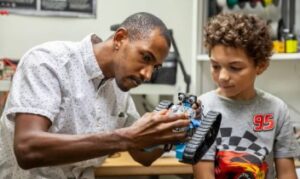January is Human Trafficking Prevention Month: Part 2 By: Justice Venture International [As we start the new…
Mentoring: If It’s Good Enough For Jesus, It’s Good Enough for Me
By Trey Hill, Senior Program Officer
I spent most of my adult life running a ministry called Mercy Street, a community development organization in the heart of West Dallas focused on youth mentoring and leadership development. When people would ask, “Why mentoring?” I would always respond with some form of “because it works.” I would follow that, a bit cheekily, with, “And it was the model Jesus used, and if it was good enough for Jesus, it’s good enough for me.”
January is National Mentoring Month. So, I thought I would share a few insights I gained over the years about the power and importance of mentoring.
First, let me define terms because mentoring has taken on many forms and meanings. The mentoring that we did and that I advocate for is face-to-face, life-on-life, one-on-one mentoring. Or what the SEARCH Institute, a youth development research and advocacy group, calls a “developmental relationship.” A developmental relationship is one where these five elements are present: 1) expresses care, 2) challenges growth, 3) provides support, 4) shares power, 5) expands possibilities. 
Something else I used to say to folks who asked me about mentoring and its efficacy was, “Take a look at your own life. How many people did you have making investments in you?”
When I look at mine, though I never had a formal mentor, I had many mentors in the form of coaches, youth pastors, friend’s parents, and camp counselors. I can honestly say that my formation as a person was deeply impacted by those who took the time to know me, encourage me, challenge, and rebuke me, and push me to be a better person. I’m sure you can identify a few people who did the same for you.
SEARCH’s research backs up this point. According to a recent SEARCH Institute study, “developmental relationships are the roots of young people’s success. ” It goes on to say, “They are essential for all young people in every community. When young people experience these relationships in their families, schools, programs, and communities, they are more likely to be resilient in the face of challenges and grow up thriving.”
Some children, however, are in circumstances where fewer of those relationships are naturally occurring and need a more formal structure or organization to facilitate mentoring relationships with caring adults. That is one reason The Rees-Jones Foundation funds programs that are specifically focused on mentoring, like Big Brothers, Big Sisters, Academy 4, and the organization I used to run Mercy Street.
 They provide a place for kids who may be in a challenging neighborhood or situation, but whose caregivers want the best for them. When their children are brought to these organizations, they have an opportunity to be matched with a mentor. The goal is for a dynamic and impactful relationship to form, and over time, the young person to grow and flourish, overcoming obstacles that may exist.
They provide a place for kids who may be in a challenging neighborhood or situation, but whose caregivers want the best for them. When their children are brought to these organizations, they have an opportunity to be matched with a mentor. The goal is for a dynamic and impactful relationship to form, and over time, the young person to grow and flourish, overcoming obstacles that may exist.
The Mentoring Effect, a report published by MENTOR: The National Mentoring Partnership makes this point clear, “Two-thirds of kids, from the lowest income and education levels, do not have mentors of any kind while growing up.”
The report also highlights the positive effects of mentoring saying, “Mentoring helps young people, especially at-risk youth, succeed in school, work, and life. A strong research base supports the efficacy of quality mentoring, including a recent meta-analysis of more than 73 independent mentoring programs that found positive outcomes across social, emotional, behavioral, and academic areas of youth development.”
Now, I may have been somewhat wry with the “If it’s good enough for Jesus” comment, but there is some truth to it, too.
Jesus, who only had three years of public ministry, spent most of his time not preaching to huge crowds and performing miracles (though he certainly did that too), but by hanging out with 12 ordinary guys. He spends even more time with three of the twelve.
What was he doing during these times? He is sharing meals, going fishing, taking long walks, and loving and encouraging them at every step. He is teaching them about the “mystery” of the gospel. He is correcting and admonishing them. He is sending them to go out and share all they are learning. It sounds a lot like mentoring to me. 
This was God’s plan to communicate the Gospel to the world. Jesus, in one of his last messages to his followers, said:
“Go therefore and make disciples of all nations, baptizing them in the name of the Father and of the Son and of the Holy Spirit, teaching them to observe all that I have commanded you. And behold, I am with you always, to the end of the age.”
And that is what they did. And we are called to do the same.
So, whether we call it mentoring or discipleship, there is transformative power in establishing developmental relationships. Through mentoring, it is our hope, every young person can thrive and reach their full potential.
That is why the Foundation supports mentoring programs and why mentoring is a key part of the Youth Formation’s investment strategy.
Share this post:
Category: Uncategorized
January is Human Trafficking Prevention Month: Part 1 By Shellie Velasco, Program Officer [As we start the…
Welcome to 2025 By Adrian Cook, Director of Research & Evaluation “But the steadfast love of the…

